The NGIAtlantic.eu project has ended in February 2023. For the follow-up initiative, visit NGI Transoceanic.

Project Coordinator (EU) :
Athens University of Economics and Business - Research Centre (AUEB)Country of the EU Coordinator :
GreeceOrganisation Type :
AcademiaStarting date :
Self-Certifying Names for Named Data Networking
Privacy and Trust enhancing technologies
The SCN4NDN project will experiment with the merger of two promising NGI technologies: Information-Centric Networking (ICN) and Decentralized Identifiers (DIDs) ICN has been on the spotlight of many research efforts for more than a decade. It has been explored as a standalone future Internet architecture, as well as an enabler for other NGI architectures, including 5G, IoT, and architectures focused on big dataand/orcyber security. ICN’s goal is to enable fast and secure content dissemination by leveraging direct and intrinsic information identification; this allows supporting multicast, multipath, and caching, as well as novel trust mechanisms.
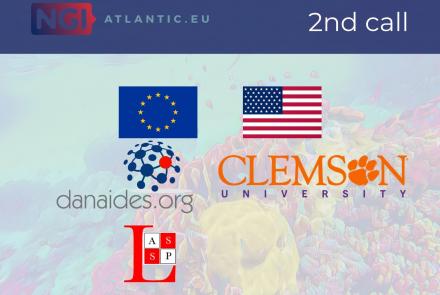
Project Coordinator (EU) :
Danaides/Sciences PO TolouseCountry of the EU Coordinator :
FranceOrganisation Type :
Non-profit OrganisationStarting date :
Responsibility to protect population through peer governance and trusted community (P2PR2P)
Privacy and Trust enhancing technologies
Peer-to-Peer Responsibility to Protect (P2PR2P) is a software developed by Danaides, which provides a peer-to-peer (P2P) platform based on integrity that allows for responsible and accountable common-pool-resources governance for humanitarian and human rights collective action. P2PR2P features are validated by the GENI and FABRIC proving grounds to keep security and privacy and decentralized data governance. This system has an impact on four different field: data protection and ownership through privacy features; system accountability and impact evaluation by means of audit trail implying DLT technology; thanks to the use of gamification P2P technology helps trust and autonomy; user-driven KPI.
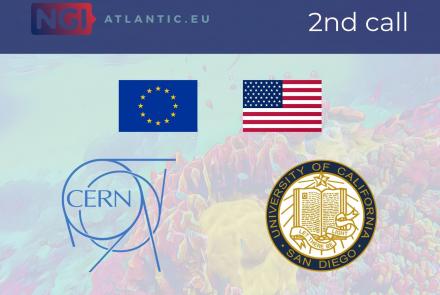
Project Coordinator (EU) :
CERNOrganisation Type :
ResearchStarting date :
CloudBank EU NGI
Decentralised data governance - experimentation of results
Scientific research generates a vast amount of data, which pose incredible challenges to be processed. For this reason, an experimental use of CloudBank is implemented in Europe by CERN and the University California San Diego (UCSD). CloudBank provides a set of managed services to access public cloud for research, supporting specialised cost management and optimisation. The European NGI experiment is deploying cloud resources and a collection of Machine Learning and HPCaaS use-cases as part of the Large Hadron Collider's scientific program. The aim is to decide whether CloudBank can be effectively used by Europe's global research communities by addressing technological, financial, and legal challenges.
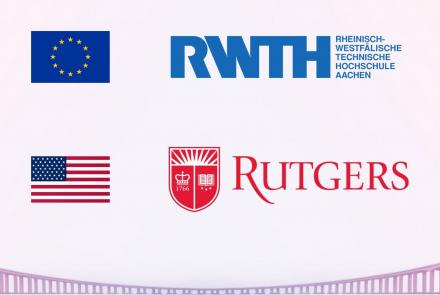
Project Coordinator (EU) :
Rheinisch-Westfälische Technische Hochschule AachenCountry of the EU Coordinator :
GermanyOrganisation Type :
AcademiaStarting date :
Experimental Study of Context Based Routing Using Deep Reinforcement Learning
Diversity of applications within the future Internet results in the need to support wide range of values for key performance indicators (KPIs) such as throughput, latency, delivery rate, etc. To be able to satisfy the target performance, it is crucial to make routing at the network edge intelligent. Our experiment combines machine learning techniques with contextual information like the number and type of users to build more accurate inference about the state of the network and to configure routes that are customized for different applications.

Project Coordinator (EU) :
Technological University DublinCountry of the EU Coordinator :
IrelandOrganisation Type :
AcademiaStarting date :
ATLANTIC-eVISION: Cross-Atlantic Experimental Validation of Intelligent SDN-controlled IoT Networks
Discovery and identification technologies
This project will perform experiments on public testbeds to establish the feasibility of applying OpenFlow and SDN in wireless IoT networks through five experiments: (1) automatic configuration/discovery of SDN in wireless IoT sensor networks, (2) ML- assisted control and data traffic path discovery experiments, (3) GPU and Hadoop cluster assisted experiments for ML algorithms, (4) Failure recovery intercity experiments, and (5) Scalability experiments. The US and the EU teams will provide expertise for experimentation on their respective testbeds. Also, both teams will integrate machine learning-assisted SDN control into IoT, allowing cross-Atlantic experimentation to "stress-test" the project’s novel algorithms.
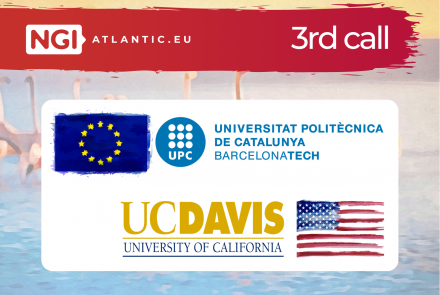
Project Coordinator (EU) :
UNIVERSITAT POLITECNICA DE CATALUNYACountry of the EU Coordinator :
SpainOrganisation Type :
AcademiaStarting date :
Experimental Assessment of Fast Quantum Key Distribution
Privacy and Trust enhancing technologies
Quantum Key Distribution (QKD) is being used to enhance security between trusted users. One of the most fundamental QKD protocols is BB84, which uses single polarized photons as qubits. Polarized photons passing through a fiber between quantum transmitter (QTx) and quantum receiver (QRx) might be distorted in case of fiber movement affect the State of Polarization (SOP), which deteriorates the Key exchange rate. A novel QKD method that includes an Artificial Intelligence (AI) -based polarization distortion compensator module (named Fast QKD) is to be experimented in a testbed equipped with the needed instruments and devices UCDavis California, US.
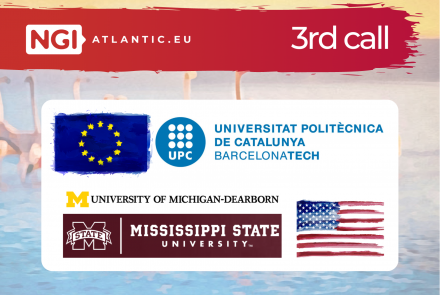
Project Coordinator (EU) :
UNIVERSITAT POLITECNICA DE CATALUNYACountry of the EU Coordinator :
SpainOrganisation Type :
AcademiaStarting date :
Adaptive decentralized federated learning in wireless mesh network (FLESHNET)
Decentralised data governance - experimentation of results
The overall goal of the FLESHNET project is to deliver building blocks for adaptive decentralized federated learning experimentally validated in the realistic conditions of a wireless mesh network testbed. Both the EU and US partners will participate in the analysis of the experimental results. The design will be complemented by the US partners with the networking perspective, while the EU partner will complement the design with an adaptive and decentralized model.
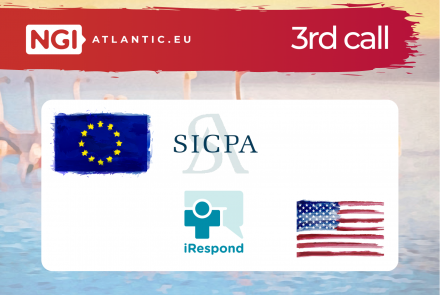
Project Coordinator (EU) :
SICPA SPAIN S.L.Country of the EU Coordinator :
SpainOrganisation Type :
SMEStarting date :
Inclusive verification of cross-border and level of assurance-dependent digital credentials
Decentralised data governance - experimentation of results
This experiment brings together researchers on both sides of the Atlantic, iRespond and SICPA, to connect different platforms and test security features—in this case European digital signatures, already used in legacy systems, and privacy-preserving biometric tools— to showcase enhanced levels of assurance for secure transmission of verifiable credentials across geographic boundaries.
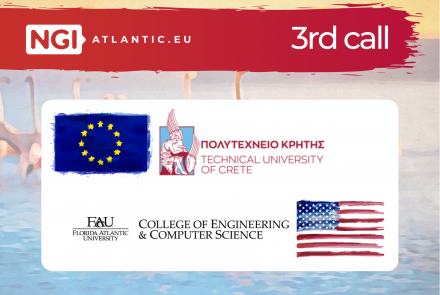
Project Coordinator (EU) :
Technical University of CreteCountry of the EU Coordinator :
GreeceOrganisation Type :
AcademiaStarting date :
Secure Communication Based on Robust 3D Localization
Privacy and Trust enhancing technologies
The proposed project is on the implementation and experimentation of secure communica- tion solutions for mobile wireless networks, building on the development of robust 3D locali- zation algorithms. The secure communication solution offered will be implemented and tested on the NSF-funded POWDER/RENEW platform in Salt Lake City, UT, through a col- laboration between the Telecommunications Laboratory of the Technical University of Crete, Greece and the Center for Connected Autonomy and Artificial Intelligence, Florida Atlantic University, US. The US Partner will implement 3D localization techniques and the EU Coordi- nator will implement secure communication links using HARQ and 5G polar coding.

Project Coordinator (EU) :
Department of Information Engineering - University of PisaCountry of the EU Coordinator :
ItalyOrganisation Type :
AcademiaStarting date :
EdgeFlooding: Exploiting Edge computing for Real-Time Monitoring and Detection of Flash Floods
Decentralised data governance - experimentation of results
Flash flood monitoring systems for just-in-time notification of flooding events will be crucial to secure any city located in prone flood areas. For this reason, an experimental implementation of a flood monitoring system has been developed at the University of Maryland, Baltimore County (UMBC). The EdgeFlooding project aims at extending this system, which adopts a centralized cloud-based approach, to create a novel implementation that adopts a distributed approach based on edge/cloud computing.
The extension will be carried out by the University of Pisa (UNIPI) with the support of UMBC. In order to assess the performance of such system, an extensive experimentation will be carried out by UNIPI on two European Fed4Fire+ testbeds, one, Virtual Wall, hosted at and managed by imec IDLabt ilab.t in Ghent, the other, Grid’5000, managed by a scientific interest group (GIS) and hosted by Inria. The aim of those experiments is to assess whether a distributed edge/cloud computing approach is feasible for the implementation of future environmental monitoring systems.
